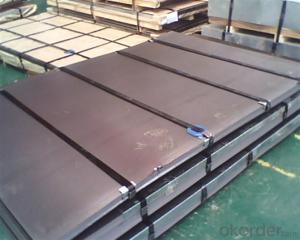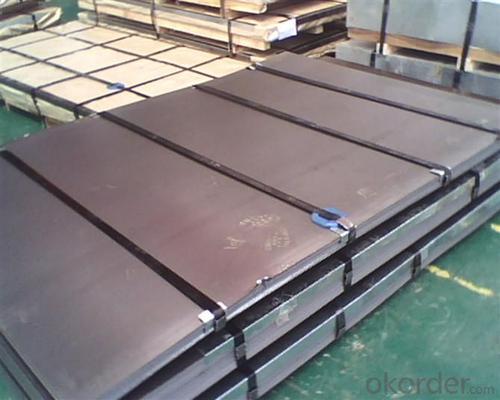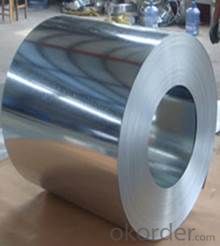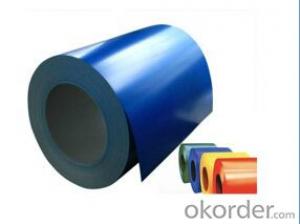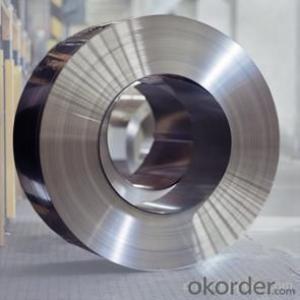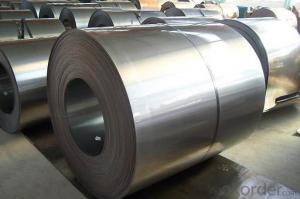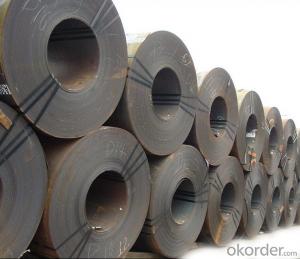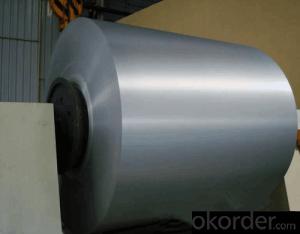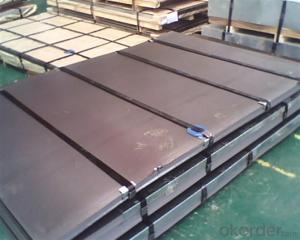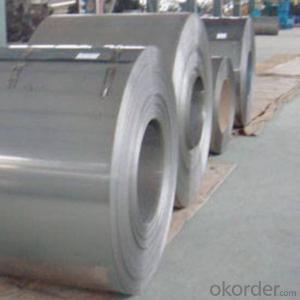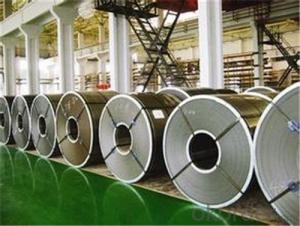CNBM-Cold Rolled Steel Coils/Sheets A36,SS400
- Loading Port:
- Tianjin
- Payment Terms:
- TT OR LC
- Min Order Qty:
- 22 m.t.
- Supply Capability:
- 200000 m.t./month
OKorder Service Pledge
OKorder Financial Service
You Might Also Like
Specification
Product Name | Cold Rolled Sheet Coil |
Material | SPCC/SPCD/SPCE/DC01/ST12/ ST14/SPCD/DC03/DC04 ect. |
Grade Standard | JIS G3302, EN10142, ASTM653, ASTM95 |
Thickness | 0.15-3.5mm |
Width | 600mm-1500mm |
Coil ID | 508-610mm |
Coil OD | max 1500mm |
Weight | 3-10 Tons |
Tolerance | Thickness tolerance:+/-0.02mm; Width tolerance:+/-5mm |
Surface | No-skin passed or Skin passed, Tensile leveled |
Surface Treatment | Chromate/Unchromate passivation, fingerprint resistant treatment, oiled/unoiled |
Annual Output | 350,000MT |
Application | Construction, hardware, home applicances, interior decoration |
General Application of Cold Rolled Steel Coil:
Classification | Designation | Characteristics | Main applications |
Commercial quality | SPCC SPCCT | Commercial quality suitable for bending fabrication and simple forming; this is the type in greatest demand. | Refrigerators, cabinets, power distribution baords and drums. |
Drawing quality | SPCD | Drawing quality second only to that of SPCEN. Excellent uniformity. | Automobile floor and roof panels. |
Deep-drawing quality | SPCE SPCF | Deep-drawing quality.With metallurgically controlled grain size, it retains its beautiful finish even after being deep-drawn. | Automobile fenders and quarter panels |
Extra deep-drawing quality | SPCG | Extra-low-carbon steel sheets with highest workability | Automobile internal panels and deep-drawn parts |
- Q: What are the common applications of pre-painted steel coils?
- Pre-painted steel coils, also referred to as pre-coated steel coils or color coated steel coils, are extensively utilized in a multitude of industries due to their versatility and endurance. The following are some of the prevalent uses of pre-painted steel coils: 1. Construction: In the construction sector, pre-painted steel coils are widely employed for roofing, wall cladding, and building panels. The array of colors available in pre-painted steel coils enables architects and designers to fashion visually pleasing structures. 2. Automotive: The automotive industry relies on pre-painted steel coils for fabricating car bodies, interior panels, and various other components. The corrosion resistance and superb finish provided by pre-painted steel coils make them the preferred choice in this field. 3. Appliances: Household appliances such as refrigerators, washing machines, and air conditioners incorporate pre-painted steel coils for their outer panels. The appealing colors and textures offered by pre-painted steel coils enhance the appearance of these appliances. 4. Electronics: The electronics industry also employs pre-painted steel coils for manufacturing cabinets and casings of electronic devices such as computers, televisions, and audio systems. The protective coating on pre-painted steel coils shields the electronic components from environmental factors. 5. Furniture: Pre-painted steel coils are utilized in the furniture industry for producing cabinets, shelves, and similar products. The extensive range of colors and finishes available in pre-painted steel coils enables furniture manufacturers to create visually appealing and long-lasting goods. 6. Signage and Advertising: In the signage and advertising sector, pre-painted steel coils are commonly used for manufacturing display boards, billboards, and signs. The vibrant colors and weather-resistant properties of pre-painted steel coils make them suitable for outdoor use. 7. Industrial Equipment: Pre-painted steel coils are employed in the manufacture of industrial equipment such as storage tanks, HVAC systems, and machinery components. The corrosion resistance and high strength of pre-painted steel coils make them suitable for these demanding applications. In conclusion, pre-painted steel coils find a wide range of applications in industries such as construction, automotive, appliances, electronics, furniture, signage, and industrial equipment. Their endurance, resistance to corrosion, and aesthetic appeal make them a popular choice for manufacturers in various sectors.
- Q: What are the common coil grades available for steel coils?
- The common coil grades available for steel coils are typically classified into three main categories: low carbon steel, medium carbon steel, and high carbon steel.
- Q: I bought a stainless steel water bottle today. I really like it, but there is no drinking spout, it just has a lid that screws on and off, and an open hole to fill it and drink out of. Is this normal for these bottles? Or do they usually come with a spout to drink from? I don't want to look like an idiot at the gym drinking from this cool bottle with no spout if there's supposed to be one! haha.
- That's normal. I'm sure there are caps that you can get that have a built in spout though.
- Q: Can steel coils be coated with holographic patterns?
- Yes, steel coils can be coated with holographic patterns. This coating process involves applying a thin layer of holographic material onto the surface of the steel coils, creating a visually striking and distinctive holographic pattern.
- Q: hey therejust wondering about changing nylon strings to steel strings...i have an acoustic guitar and it has nylon strings, but i was thinking about switching to steel strings, as i think it sounds better.this might sound really stupid... but is that possible? i mean they call it a steel stringed GUITAR and nylon stringed GUITAR, so if i wanted to switch would i have to get a whole new guitar? please help, im reaaally confused!thanks
- I asked my guitar teach this and the thing with changing from nylon strings to steel strings is that the nylon tuning forks are accustomed to nylon and tend to slip. But, in say that you can do it, but, you would have to wait awhile for them to start sticking. If i have helped the Your welcome and Thanks! =]
- Q: How are steel coils used in automotive manufacturing?
- Steel coils are used in automotive manufacturing to produce various components and parts such as body panels, chassis, doors, and other structural parts. The coils are processed through different techniques like cutting, stamping, and welding to shape them into the desired form. This allows for the production of strong and durable automotive parts, ensuring the safety and reliability of vehicles.
- Q: How are steel coils used in the production of storage systems?
- Steel coils are used in the production of storage systems by being formed into sheets or strips, which are then shaped and welded to create the framework and shelves of the storage units. The high strength and durability of steel make it an ideal material for supporting heavy loads and ensuring the longevity of storage systems.
- Q: How are steel coils used in the production of industrial tanks?
- Steel coils are used in the production of industrial tanks as they are rolled and shaped into the desired form, providing the necessary strength and durability for the tank structure.
- Q: How are steel tape measures installed?
- That's the tape measure. There's a small card with no card in the middle of the screw! So it can't be retracted automatically! The solution is to wrap the open tape to the end!
- Q: What are the common welding defects in steel coils?
- There are several common welding defects that can occur in steel coils during the welding process. These defects include: 1. Porosity: This is characterized by small holes or voids in the weld metal, which are caused by gas entrapment during the welding process. It can weaken the weld and make it more susceptible to corrosion. 2. Lack of fusion or incomplete penetration: This defect occurs when there is inadequate fusion between the base metal and the weld metal, or when the weld metal does not fully penetrate the joint. It can result in a weak or brittle weld. 3. Cracks: Cracks can occur in the weld metal or in the heat-affected zone (HAZ) of the base metal. They can be caused by factors such as high stress levels, improper cooling, or inadequate preheating. Cracks can significantly reduce the strength and integrity of the weld. 4. Undercutting: Undercutting is a groove or depression that forms at the toe of the weld due to excessive melting of the base metal. It weakens the weld and can lead to stress concentration and potential failure. 5. Excessive spatter: Spatter refers to the small droplets of molten metal that are expelled from the welding arc and can land on the surface of the steel coil. Excessive spatter can result in a rough or uneven surface finish and may require additional cleaning or grinding. To minimize these welding defects in steel coils, it is important to ensure proper weld preparation, including cleaning and removing any contaminants from the surface of the steel. Additionally, using the correct welding parameters, such as appropriate heat input and travel speed, can help to minimize defects. Regular inspection and quality control measures can also help to identify and address any defects before they become more serious issues.
Send your message to us
CNBM-Cold Rolled Steel Coils/Sheets A36,SS400
- Loading Port:
- Tianjin
- Payment Terms:
- TT OR LC
- Min Order Qty:
- 22 m.t.
- Supply Capability:
- 200000 m.t./month
OKorder Service Pledge
OKorder Financial Service
Similar products
Hot products
Hot Searches
Related keywords
